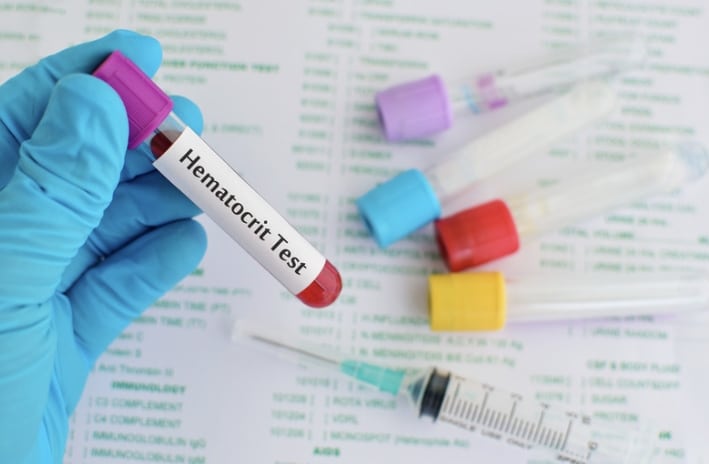High hematocrit: causes and possible treatments

Hematocrit is a blood test that measures the number of red blood cells in the blood.
Normal levels vary by age, gender, and altitude. If the results show an excessive amount of red blood cells, it is high hematocrit, This can be due to various causes, such as hematological diseases, EPO use, pregnancy or living in high altitude places.
Proper diagnosis and treatment are key to preventing complications.
What is hematocrit?
The hematocrit is a blood parameter that indicates the proportion of red blood cells in relation to the total volume of blood.
This measure obtained through a blood test and is expressed as a percentage.
Red blood cells, also known as erythrocytes, are blood cells that carry oxygen to tissues and remove carbon dioxide generated by tissues.
normal values for age
Normal hematocrit values vary based on age, gender, and the altitude of where a person lives.
In infants and young children, hematocrit values are slightly higher than in adults.
In men, normal hematocrit values usually range between 38,8% and 50%, while in women they are between 34,9% and 44,5%.
People over the age of 60 are more likely to have high hematocrits, which can be a sign of cardiovascular, respiratory, and kidney disease.
Additionally, lack of physical activity and inadequate nutrition can also increase hematocrit levels in this population.
Does altitude affect?
In relation to altitude, when a person lives in higher places, the amount of oxygen that the body receives is less, so there is an increase in the percentage of red blood cells to compensate for the situation.
For this reason, in mountain areas, normal hematocrit values can be considered high compared to people who live at sea level.
People who live at high altitudes can develop high hematocrits due to reduced oxygen levels in the air.
Depending on altitude, normal hematocrit values may vary. In general, a hematocrit level above 50 percent is considered to indicate high hematocrits if the person lives in a low-altitude area.
EPO use
The use of EPO, a hormone that stimulates the production of red blood cells, can also cause an increase in hematocrit values, so its consumption should be taken into account in athletes who want to improve their performance.
Pregnancy
Pregnant women can also experience high hematocrits due to the increased volume of blood in their body.
In pregnancy, hematocrit values may decrease slightly due to physiological changes that occur in the body of women.
This is a common condition and usually does not pose a health risk to the mother or baby.
It is important to note that high hematocrit levels can be an indication of underlying disorders, and medical treatment should be sought if symptoms are experienced. Talking with a medical professional is important to find the precise causes and possible treatments.
How is high hematocrit diagnosed?
Diagnosis of high hematocrits is important to determine the underlying cause of the condition.
There are several types of tests that can be performed to establish an accurate diagnosis and once the diagnosis is made, the doctor can design the appropriate treatment.
Tests to detect hematological diseases
An important test that is performed to detect hematological diseases is the complete blood test.
This test measures the hematocrit level in the blood and determines if these levels are within normal ranges for age, gender, and altitude.
In addition, additional tests may be done to determine the underlying cause of high hematocrits, such as a blood test for the presence of erythropoietin (EPO), a hormone that stimulates the production of red blood cells in the bone marrow.
imaging tests
Imaging tests are also helpful in diagnosing high hematocrits.
One of the most common tests is abdominal ultrasound, which can show an increase in the size of the liver and spleen, indicating increased production of red blood cells in the bone marrow.
CT and MRI scans may also be done to obtain more detailed images of the liver and spleen to help determine the underlying cause of the high hematocrits.
Treatment for high hematocrit
Treatment for high hematocrits can vary depending on the underlying cause.
Here are some treatment options that can help reduce high hematocrits:
diet modification
A balanced, nutrient-dense diet is essential for maintaining good health.
To prevent diseases that cause high hematocrits, it is important to eat a varied diet that includes foods rich in iron, such as meat, legumes, and green leafy vegetables.
It's also important to make sure you're getting enough vitamin B12 and folic acid, which are found in foods like meat, fish, dairy, and vegetables.
- Reduce iron-rich foods: It is recommended to reduce the consumption of foods rich in iron, such as red meat, to avoid increasing the amount of red blood cells in the blood.
- Increase in liquid-rich foods: It is recommended to increase the consumption of foods rich in liquids, such as fruits and vegetables, to help maintain good hydration.
Exercise
Regular exercise can help reduce high hematocrits by stimulating urine production and increasing red blood cell removal.
It is recommended to exercise moderately and talk to a specialist before starting any training program.
Avoid dehydration
Adequate hydration is essential to maintain the health of our body and avoid the appearance of high hematocrits.
It is recommended to drink at least 8 glasses of water a day, and more in case of exercise or in hot and humid situations, since they increase the loss of fluids from the body.
Solution in case of specific diseases
If you suffer from a disease that increases the probability of suffering high hematocrits, such as chronic obstructive pulmonary disease (COPD), it is important to follow medical recommendations to control the disease and prevent its complications.
- A balanced diet rich in nutrients is essential to maintain good health.
- Regular exercise is beneficial in preventing diseases related to high hematocrit.
- It is important to drink enough water to maintain good hydration in the body.
- If you suffer from a disease that increases the probability of suffering high hematocrits, following medical recommendations is essential.
There are no previous results.




























